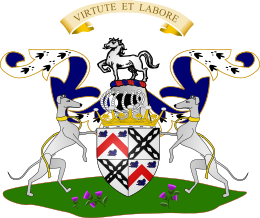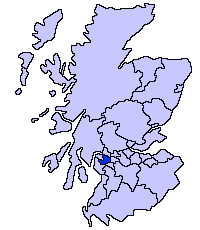Clan Cochrane facts for kids
Quick facts for kids Clan Cochrane |
|
|---|---|

Crest: A horse passant Argent
|
|
| Motto | Virtute Et Labore (By valour and exertion) |
| Profile | |
| Region | Lowlands |
| District | Renfrewshire |
| Animal | Boar |
| Chief | |
 |
|
| The Rt. Hon. Iain Cochrane, 15th Earl of Dundonald | |
| The 15th Earl of Dundonald | |
| Seat | Lochnell Castle |
| Historic seat | Auchindoun Castle |

Clan Cochrane is a Scottish clan from the Scottish Lowlands. A "clan" is like a big family group, often sharing a last name and history. The Cochranes have a long and interesting past, with roots in ancient Scotland.
Contents
History of Clan Cochrane
Where Did the Cochranes Come From?
The Cochrane family name comes from a place called Cochrane in Renfrewshire, Scotland. This area is near Paisley.
One old story says the first Cochrane ancestor was a Viking. He settled in Scotland between the 700s and 900s.
The name "Cochrane" might come from two Gaelic words. Together, they mean "The Roar of the Battle" or "Battle Cry." This fits with the clan's history of brave warriors.
The clan's special animal is the boar. The chief's shield has three boar's heads. This is said to represent a warrior who bravely defeated three wild boars.
Another story says the name came from a leader praising a brave fighter. He called him "coch ran," meaning "brave fellow."
The first time the name "Cochrane" was written down was in 1262. A person named Waldeve de Coueran was a witness to an important document. Later, in 1296, William de Coughran signed a paper agreeing to follow King Edward I of England.
Early Days: 14th to 16th Centuries
In 1346, John de Coveran was part of choosing a new leader for Paisley Abbey. Later, Goseline de Cochran witnessed some land deals for the Abbey in 1366.
Robert Cochrane was an important figure in the 1400s. He built most of Auchindoun Castle. This castle later passed to other clans.
In 1456, Robert Cochrane gave his lands to his successor, Allen Cochrane. King James II of Scotland confirmed this change.
In 1556, William Cochrane, who was the chief at the time, had his land ownership confirmed by Mary, Queen of Scots.
In 1592, Chief William Cochrane built a tall stone building. It was known as Cochrane Tower or Cochrane Castle.
Civil War and New Titles
Around 1638, Dundonald Castle in Ayrshire became a Cochrane property. This castle was important for the family's future titles.
During the 1600s, there was a big conflict in Britain called the Civil War. The Clan Cochrane supported the King. Sir John Cochrane traveled for the King during this time. The chief, Lord Cochrane, also fought in a battle called the Battle of Preston (1648).
In 1669, the Cochrane chief received a higher title. Sir William Cochrane became the 1st Earl of Dundonald. This made the family even more important.
The "Fighting Cochranes" and Famous Heroes
During the Jacobite rising of 1745, some Cochranes supported the British government. Captain John Cochrane and Captain Basil Cochrane fought for the government. They were captured at the Battle of Prestonpans. However, William Cochrane of Ferguslie fought on the other side and won.
Later, in the 1700s and 1800s, many Cochranes became famous. They were known as the "Fighting Cochranes" because of their bravery in the army and navy.
One of the most famous was Thomas Cochrane, 10th Earl of Dundonald (1775–1860). He joined the Royal Navy when he was 18. He was an amazing naval commander. Once, his small ship with only 54 sailors captured a Spanish warship with over 300 sailors and many guns!
He also defended Trinidad Castle against the French in 1808. Later, he became the commander of Chile's navy. He helped Chile, Peru, Brazil, and Greece gain their independence. He is buried in Westminster Abbey in London, a very important place.
Modern Times: 20th Century Contributions
The father of the current chief, the 14th Earl, was a soldier. He fought in World War Two in North Africa, Italy, and Greece.
Sir Ralph Cochrane was another important Cochrane. He was a British pilot and a Royal Air Force officer. He is famous for his role in "Operation Chastise," also known as the "Dambusters" raid.
Who is the Clan Chief Today?
The current chief of Clan Cochrane is Iain Alexander Douglas Blair Cochrane. He is the 15th Earl of Dundonald.
Clan Castles: Homes of the Cochranes
Over the years, the Cochranes have owned several castles. These include:
- Cochrane Castle
- Auchindoun Castle
- Johnstone Castle
- Dundonald Castle
See Also
 | James Van Der Zee |
 | Alma Thomas |
 | Ellis Wilson |
 | Margaret Taylor-Burroughs |

